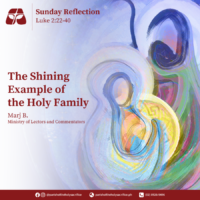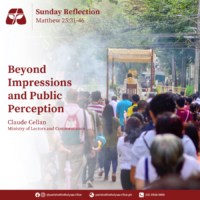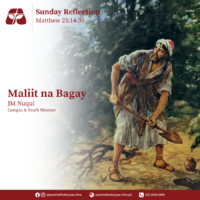Reflection on the Third Sunday of Easter
April 26, 2020
Temporary blindness
Rex Lago Paras
Ministry of Lectors and Commentators
On this Third Sunday of Easter, we once again read the passage in the Lucan gospel recounting Jesus’ appearance to two of his disciples on the road to Emmaus (Luke 24:13-35). This particular narrative is proclaimed several times during Easter. It is one of the gospel texts for Easter Sunday, specifically for the evening masses of that great day celebrating the Lord’s resurrection. It is also the gospel reading for Wednesday within the Octave of Easter. And, it is today’s Good News as we celebrate the Third Sunday of Easter.
The story begins with some background. The two disciples “were going to a village seven miles from Jerusalem called Emmaus.” (Lk 24:13) As they were walking toward their destination, “they were conversing about all the things that had occurred” (Lk 24:14) referring to Jesus’ crucifixion, death and resurrection. The protagonist in the story which they were recalling, “Jesus himself[,] drew near and walked with them, but their eyes were prevented from recognizing him.” (Lk 24:15-16) The subject of their conversation joined them in their journey, but they did not recognize him. So clueless were they that when Jesus asked them what they were discussing, one of them had the audacity to reply, “Are you the only visitor to Jerusalem who does not know of the things that have taken place there in these days?” (Lk 24:18) Then, they went on to explain to the person who least needed it what “happened to Jesus the Nazarene, who was a prophet mighty in deed and word before God and all the people, how [their] chief priests and rulers both handed him over to a sentence of death and crucified him.” (Lk 24:19-20) They told Jesus that “it is now the third day since this took place” and “[s]ome women from [their] group…reported that they had indeed seen a vision of angels who announced that he was alive.” (Lk 24:21-23)
The exchange between Jesus and the two disciples is amusing. How can they not recognize the man that is the main character in the story which they passionately related? Biblical commentaries venture an answer by pointing out that “[a] consistent feature of the resurrection stories is that the risen Jesus was different and initially unrecognizable.” (NABRE) The two disciples’ ability to recognize Jesus may have been impeded at first but once “he was with them at table, he took bread, said the blessing, broke it, and gave it to them[,] …their eyes were opened and they recognized him[.]” (Lk 24:30-31)
Our experience these days is not far from that of the two disciples. During this trying period in our lives brought about by the worsening pandemic, it may be difficult to immediately recognize Jesus in our midst. Our situation is aggravated by our continued isolation from the larger community. We have always cherished communion with our brothers and sisters as central to establishing communion with God, but how do we achieve such communion when we are secluded in our homes and our actions are limited? How can we recognize that God’s hands are at work when every time we turn to the news, we see increasing numbers of those afflicted with and dying because of COVID-19, people losing their livelihood and going hungry? It is quite challenging to recognize that God is with us and to feel His presence when we are constantly shaken by the realization that despite all the quarantine measures we have been observing, this plague is far from over.
Like the two disciples, many of us are probably suffering from an impediment which prevents us from recognizing Jesus at once. Our vision is impaired largely because of the dreadful situation we are currently facing. We, therefore, ought to forgive ourselves for our temporary inability to recognize Jesus. Instead of beating ourselves up for doubting Jesus’ presence in our lives and for questioning where God is in all this, let us pray for the grace that will eradicate our momentary blindness. Let us more fervently implore Jesus to open our eyes and lead us to recognize him anew—the Messiah who conquered even death.


